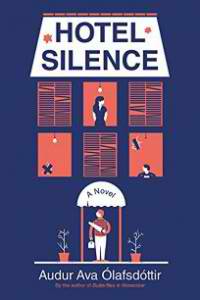Hotel Silence by Auður Ava Ólafsdóttir
 Monday, March 26, 2018 at 9:40AM
Monday, March 26, 2018 at 9:40AM 
First published in Iceland in 2018; published in translation by Grove Atlantic/Black Cat on February 13, 2018
Here’s some good advice from Jónas’ mom: “Instead of putting an end to your existence, can’t you put an end to being you and just become someone else?” The question in Hotel Silence is whether Jónas will listen to his mother.
Jónas kept a diary of his sexual experiences. Reading it, he remembers how Gudrún told him that she was pregnant, a revelation that led to marriage. They named the baby Waterlily. Only later did Gudrún tell Jónas that she was pregnant by another man. Jónas and Gudrún have been divorced (and Jónas has been celibate) for eight years, but he has nevertheless had a water lily tattooed over his heart.
Jónas visits his mother regularly, but she doesn’t always remember the visits. He has become obsessed with celebrity suicides and is considering how to take his own life in a way that won’t burden Waterlily with his empty flesh.
Jónas decides to do the deed at Hotel Silence in a remote country that has been devastated by war. Iceland hasn’t had a war in centuries, leaving Jónas unprepared for a city where nearly all the stores are closed and the hotel clerk warns him of the places where land mines and unexploded bombs make walking treacherous. Fifi and his sister May are running the hotel by default, the owner having fled to a less dangerous place. The only other regular occupant is May’s son, who was born in the basement as bombs fell.
Jónas gives himself a week to live. He has taken a drill and some tools with him and finds himself making small repairs so that his room will be more comfortable, although (as he repeatedly tells May) he isn’t a carpenter or a plumber — his skill is furniture restoration. Eventually he’s pressed into making repairs elsewhere in the hotel, and later in other buildings. His neighbor asks him if he plans to fix the whole country with his little drill, but it seems obvious to the reader that Jónas is really trying to fix himself, to find a reason to live another day.
Despite his desire for death, Jónas repeatedly encounters people who are surrounded by death but persist in living. He realizes early on that “in the land of death there isn’t the same urgency to die.” The novel’s central question is whether and when Jónas will end his life. Will staying in a country that needs to reinvent itself inspire him to reinvent himself?
Hotel Silence is a rumination on war and ruin. At the same time, it’s a very personal story of a man who imagines himself ruined and his journey of rediscovery. Some of the themes might be obvious, particularly the importance of finding purpose in life as an incentive to keep living, but the more subtle theme involves the struggle to make sense of life when it doesn’t go the way one imagined it would. The juxtaposition of Jónas’ emotional suffering with the more intense suffering of women who lost everything in a war brings home the point that misfortune is arbitrary, that it is unrelated to one’s value as a person, and that persevering in the face of adversity is based on the power of hope for a better future, even if “better” is nothing more than making a connection with another person.
Auður Ava Ólafsdóttir’s prose is effortless and economical. Her focus on a small, slice-of-life story makes it possible to illuminate big themes. As the title implies, this is a quiet story — the silence that follows a war, the voices that are not yet ready to speak — but the story suggests that “Silence saves the world.” I don’t know if that’s true, but the silence between sentences in this masterful story speaks volumes.
RECOMMENDED